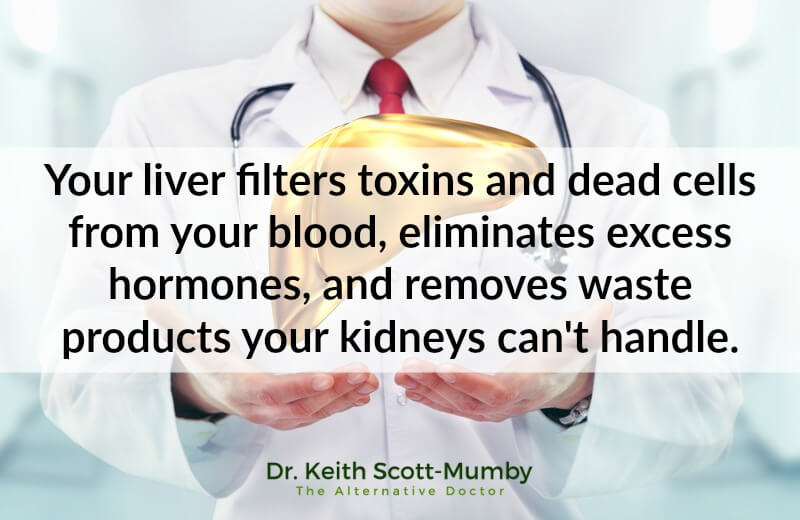Taking steps to improve liver health is not just important…it’s literally life or death.
As part of your digestive system, the liver is the largest (solid) organ in the human body. It’s about the size of a football! Only your skin is bigger.
This incredibly underappreciated organ (in comparison to the brain or heart that everyone talks about) is responsible for carrying out more than 500 vital daily functions you require to live. That’s just the ones researchers have discovered!
One incredible aspect of this organ is that it’s capable of regeneration. One fascinating article in Science Daily about this very topic states, “Even if more than fifty percent of its overall mass is damaged, it can regenerate itself completely. This amazing ability is essential. The liver is the body’s most important metabolic organ and has the task, among others, of detoxifying the blood. When a liver has recovered after damage caused by drugs, alcohol consumption, or a viral infection, this complex architecture must be restored.”
If your liver fails and a living donor that matches the patient is found, 40-60% of the donor’s liver is removed and transplanted. In both patient and donor, the livers will grow back into complete and fully functioning structures.
Top 7 Functions of Your Liver
- Filters toxins and dead cells from your blood.
- Removes waste products your kidneys can’t handle.
- Creates essential bile which helps break down fats and metabolize crucial fat-soluble vitamins such as A, D, E, F, and K.
- Eliminates excess hormones.
- Balance and maintains electrolyte levels.
- Manages glucose levels.
- Stores nutrients to boost your energy when you need it.
This is (obviously) far from everything your liver does but these are the ones that, when compromised, cause immediate problems throughout your entire body. Learning how to improve liver health (and actively avoid damaging your liver) is a “right now” situation. It’s never too late (or early) to take care of an organ that does so much to take care of you!
There’s a common misconception that alcohol-related liver disease (cirrhosis) is the primary concern. In other words, you might think that if you don’t drink, you don’t have anything to worry about. That is blatantly untrue!

Common Causes of Liver Failure
- Alcohol abuse
- Substance abuse
- Acetaminophen overuse or overdose (better known as Tylenol™)
- Prescription medicine
- Herbal supplement overuse (particularly ephedra, kava, or skullcap)
- Viral infections (hepatitis, Epstein-Barr, herpes simplex, and others)
- Autoimmune disease (and resulting inflammation)
- Poor or deficient nutrition (high intake of unhealthy fats, sugar, and salt)
- Cancer or genetic conditions
- Toxin exposure (chemicals, contaminated blood, pollutants)
- Obesity (which substantially raises your risk of NAFLD)
- Getting too much iron or vitamin A
All Liver Disease is NOT Alcohol Related!
Approximately 100 million Americans suffer from non-alcoholic fatty liver disease (NAFLD) – between 25-30% of the population of the United States. Having a fatty liver is linked to obesity and increases your risk for type 2 diabetes.
NAFLD, left untreated, can lead to severe inflammation and permanent scarring of the liver. The symptoms are similar to cirrhosis. After a certain point of accumulated or acute damage, the only option is a liver transplant.
Duke University School of Medicine released a study that indicated increasing caffeine intake (coffee and tea) can reduce fatty liver in individuals with non-alcoholic fatty liver disease. Along with improving liver function, coffee and caffeine intake has been shown to reduce the risk of fibrosis in individuals with fatty liver disease.
However, though caffeine is good to treat NAFLD and improve liver health, the delivery system is crucial. One of the jobs your liver performs is cleaning out toxins such as the chemical dyes and artificial sweeteners found in sodas. There are literally hundreds of studies attesting to the dangers of sodas to your overall health – whether they are diet or not.
Coffee and tea, especially green tea, are excellent choices. They’re natural and contain few artificial ingredients. The goal is to help your liver, not to give it more work. Consider your morning coffee (or tea) a dose of daily “medication.”
Other “liver loving” foods are salmon, leafy greens, berries, nuts, seeds, pumpkin, beans, legumes, probiotic-rich foods, and plenty of water!
To improve liver health long-term, lifestyle choices and nutrition play the biggest role. Pour yourself a nice cup of coffee without guilt (and love your liver at the same time).
